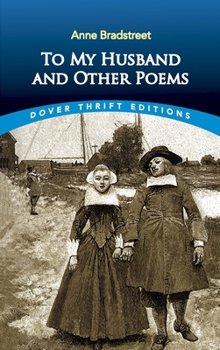To My Husband and Other Poems
Select Format
Select Condition 
Book Overview
The daughter of one colonial governor and the wife of another, Anne Dudley Bradstreet (1612-72) was also a skilled and accomplished writer, whose collection of poetry, The Tenth Muse Lately Sprung Up in America, was the first volume of original verse written in the colonies. In addition to being America's first poet, she was also, in great likelihood, the first professional woman poet in the English language. This collection of poetry, selected from...
Format:Paperback
Language:English
ISBN:0486414086
ISBN13:9780486414089
Release Date:November 2011
Publisher:Dover Publications
Length:80 Pages
Weight:0.18 lbs.
Dimensions:0.2" x 5.2" x 8.3"
Age Range:14 years and up
Grade Range:Grade 9 and higher
Customer Reviews
3 ratings
what's not to love?
Published by Thriftbooks.com User , 16 years ago
Bradstreet's earlier poems skillfully rework the constraints of a female author in seventeenth-century New England. Her later domestic poems are tender, artful if less showy, at times even sensual. The critical tide has turned away from the later work for which she is better known (and which the Dover edition incongruously puts up front). But it's interesting how we grow, as readers and as people, with Bradstreet. The Harvard edition is better annotated, a nice edition is available online, but this Dover thrift book works just fine.
Clever and Modest Protest Poem
Published by Thriftbooks.com User , 18 years ago
Looking at what I think is the best Bradstreet poem, she seems a clever writer that had a good understanding of how to speak in her Puritan society and how to address inequality without backlash. The tone of Anne Bradstreet's poem, titled, "Prologue," begins with an epic feeling, but every third line of the first two sestets, the narrator curtsies and takes a humble step back. At first, the narrator's humble pleas seem coquettish, as she says that "Wars...Captains, and...Kings" (1) are too "superior things" (3) for her to write about. However, by beginning the poem in this way, she proves that her "mean Pen" (3) and "obscure lines" (6) can do exactly the things that the Pens of male poets can. In the second stanza, the narrator continues to separate her abilities from such greats as "Bartas," (11) and continues deprecating her "simple" skills (12). The plugs against her ability begin to show signs of irony, as her protests against the status quo increase in volume and regularity. By the fifth sestet, her tone transforms into one of tasteful opposition against the norms of society. She does not accept her place in the home quietly: "I am obnoxious to each carping tongue / Who says my hand a needle better fits" (25-26). In addition, she concludes the stanza with the futility of penning poems for an audience that scorns women's abilities: "If what I do prove well, it won't advance, / They'll say it's stolen, or else it was by chance" (29-30). The protest speaks to us of the era and the world of the narrator. As the protest seems to rise in the middle, it curtails in the end. She once again subordinates herself - "Men can do best, and Women know it well" (40). However, as she does so, she continues to make her plea for equal rights, asking that women be recognized for their merits in poetry as well. In the final sestet, in high poetry, the narrator cuts loose with grand imagery, yet she remains humble, creating heavy irony again. The implication of the last two lines is that her "unrefined ore," her poetry, will make men's superior "glist'ring gold" poems all the more excellent (47-48), as surely a woman cannot outdo the men. It's a challenge. Bradstreet manages to do four separate things in this poem: she flatters men's egos, she pokes fun at patriarchy, she makes a logical argument for equal rights, and she writes a vivid poem. It all gets done at the same time, and in so polite a way that she doesn't come across as subversive or irritated at all.
One of the great foremothers of American literature
Published by Thriftbooks.com User , 23 years ago
Anne Bradstreet (1612-1672), a poet of colonial North America, is a pioneering figure in the history of literature of this continent. "To My Husband and Other Poems" gathers together 72 pages of her poetry. Hers is, despite the centuries that separate us from her, a very engaging and meaningful poetic voice.Many of the poems in this volume are about her family members, and about the joys and sorrows of family life. Bradstreet writes with great warmth and sensitivity about her husband, children, parents, grandchildren, and daughter-in-law. Her poem "To my Dear and loving Husband" is, in my opinion, one of the most beautiful love poems ever written. Overall, her family-related poems give real insight into the struggles faced by women of her era, but these poems also have a universality that transcends her time.There is a lot of other good stuff in this volume. Bradstreet's voice is often quite witty (especially in "The Author to her Book"). "The Prologue" is a fascinating proto-feminist defense of female literary aspiration. Also fascinating is her tribute to England's Queen Elizabeth I. Bradstreet's poetry is essential for scholars of American literature. But her work should be read not just for scholarship, but also for the real humanity and artistry of her voice.






